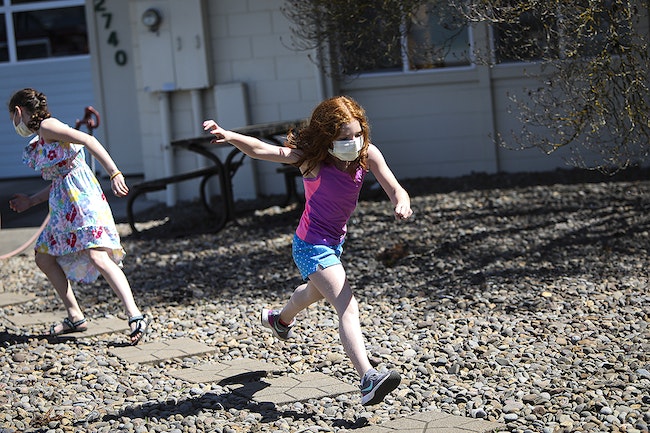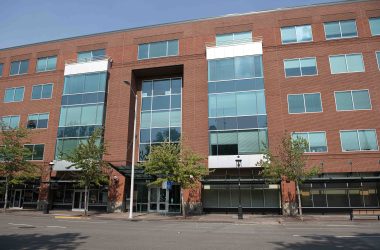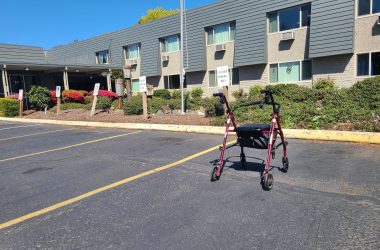
Julia Marie Dupuis, 6, center, and sister Trinity, 9, play while wearing masks outside of Salem Fire Department Station 6 on Friday, April 10. (Amanda Loman/Salem Reporter)
NOTE: Salem Reporter is providing free access to its content related to the coronavirus as a community service. Subscriptions are vital to continue this so please sign up today.
For a month now, the measure of life in Salem has been six feet.
The distance of two yardsticks disciplines where people stand in line, how close they sit in what few meetings are left, and the space between joggers and walkers on city paths.
Like the rest of Oregon, Salem has lived on a modified lockdown since March 23, its people ordered home by Gov. Kate Brown to stall the spread of COVID-19. Now, she is considering ways to let commerce and life resume something approaching normal.
But the freedom to once again hold big weddings, dine out with friends and travel to coastal cities and mountain parks won’t come soon, not until the mid-Willamette Valley gets a better grip on the coronavirus that governs decisions these days by elected officials, business owners and parents.
Marion County remains an Oregon hotspot for infections, with 371 people confirmed infected with the respiratory disease. To date, 14 have died. In Polk County, 33 have tested positive for COVID-19, and one has died.
Frustration with limits imposed by the governor and health authorities is growing. Protesters in Salem last week circled the Capitol, insisting their rights were compromised by Brown’s order, though her legal authority is so clear it can be backed up with criminal prosecution for those who violate its terms.
Ray Ogden of Salem, who used to work for Kaiser Permanente, said Brown’s orders are unconstitutional. He said he feels he’s in a communist country as he waits in line to go into a grocery store.
“You can’t tell me where I go, when I go, how I get there and then threaten me if I do. That’s way too far,” Ogden said.
Another protest is scheduled in Salem for Saturday, May 2.
Meantime, Salem people, institutions and businesses have adapted to a changed way of life. Now, for instance, Zoom means gather for an electronic meeting, not get someplace fast.
A cascade of orders
The pace of the change was quick.
Oregon’s first confirmed infection of the coronavirus was announced on Friday, Feb. 28. Marion County reported its first case on March 8 – the same day Brown declared a state of emergency to focus government attention on the global pandemic.
Over the next month, her limits on life mounted week by week, sometimes day by day.
Among the most immediate local impacts came from a March 10 restriction on visitors to nursing homes and assisted care facilities, requiring places like Bonaventure of Salem and Avamere Court in Keizer to allow no more than two “essential” visitors for each resident at any one time.
School officials who had been following guidance that they still could conduct class learned of new instructions on March 12 that limited school gatherings and events. Sports events stopped in their tracks.
More importantly, the governor announced on that Monday night that all schools would close for a few extra days, creating a two-week spring break but with classes expected to resume.
Over the next two weeks, increasingly tighter restrictions emerged.
On March 16, the governor prohibited gatherings of more than 25 people, ending church services, concerts and other public events. Restaurants and bars suddenly couldn’t serve meals, at least to seated guests. In Salem and across Oregon, some restaurants closed, others added takeout and delivery service to survive.
A week later, as Oregon’s count of those infected mounted, the now-famous “stay home” order came. The governor on March 23 banned any gatherings where people couldn’t stay six feet apart. She told Oregonians to stay home “whenever possible” and ordered parks, playgrounds and skate parks closed.
The governor said that most businesses could continue operating – but only if they enforced standards to keep customers and employees as protected as possible from exposure to the virus.
The governor did shut down barbers, hairdressers, gyms and theaters, concerned that close contact was a path to spreading the virus. Suddenly there was no place to go for a haircut or styling in Salem, with places like OK Barber Shop on State Street or Salon 554 on Ferry Street closed.
And then came the order that educators dreaded but anticipated. On April 8, the governor said schools couldn’t re-open this year and that teaching would go on long distance. Leaders in the Salem-Keizer School District scrambled to rebuild curriculum and school operations for 41,000 students.
For 1,900 high school seniors, March 13 proved to be their last day of class. One by one, those with enough credits got calls from their school to say that they were now graduates, a deflating finish for the Class of 2020.
Parents, teachers and school administrators adjusted to new ways of teaching, though there would be much less class time. Teachers became broadcasters, conducting class online via streaming platforms.
 A woman wearing a mask walks along Liberty Street in downtown Salem on Thursday, April 16. (Amanda Loman/Salem Reporter)
A woman wearing a mask walks along Liberty Street in downtown Salem on Thursday, April 16. (Amanda Loman/Salem Reporter)
Businesses suffer, workers lose jobs
Day by day, the economy of the Salem area worsened. Layoffs mounted by the week as businesses continued scaling back or closely entirely, unable to survive a steep drop in customers. National retailers anchoring downtown such as Macy’s and JC Penney shut down. Malls buttoned up.
By mid-April, more than 13,500 residents in Marion and Polk counties had signed up for unemployment benefits, bolstered with an additional $600 a week provided by an emergency act of Congress.
The governor helped renters too, shielding them from evictions if they couldn’t pay because of the pandemic. Utility companies stopped shutting services over past-due bills.
Those still with a job saw changes. For many, masks and gloves became part of the uniform.
Now grocery checkers work behind plastic. Police ask people to come out of their homes to talk.
More are working from home, including nearly half of the Oregon Department of Transportation’s statewide work force of 4,500. The odds are good that curious children or barking dogs will intrude on a home-based video conference.
Employers struggle too. The state calculates that a year ago, Oregon had 107,000 firms – with the majority employing fewer than five people.
An unknown number have closed for now, forced to do so by government order or economic necessity.
To stave off business failures, Congress set aside $359 billion to give employers money that would start as a loan but would be turned into a grant if they kept people working. The system to get at the money was built in a rush and it showed.
Banks and other lenders couldn’t get program details. Businesses couldn’t find lenders willing to take their applications. And in a matter of days, the money was gone and employers across the Salem area found they were too late.
Congress and the Trump administration were on track Tuesday, however, to pour in billions more to help employers still waiting for government help.
Meantime, Marion County commissioners did what they could to help, dipping into the county treasury to award grants of up to $5,000 to small businesses. The first round of money was spoken for in just moments after the online application system opened. Commissioners funded a second round.
The Salem Area Chamber of Commerce started a “Salem Eats” Facebook page to connect local eateries with people seeking a restaurant for takeout or to deliver.
Oscar Rodriguez opened Don Bigote last year at 3390 Portland Road N.E. to sell crepes, churros, ice cream and smoothies.
He said that business is steady and selling lots of churros. Rodriguez said that customers used to come in and get one for themselves.
“Now they come in and they get it for the whole family,” he said.
Mina Khamphilavong has been serving Thai and Laotian food for seven years at Mina’s Cafe, located at 3995 Commercial St. S.E.
She said that she’s seen a lot of new customers, introducing them to lesser-known foods. She said customers are trying larb, a meat salad from her native Laos made with lime and cilantro. Khamphilavong said she sells out of her Laos-style chicken wings made with lots of garlic and ginger.
“Even the bone is good,” she said.
Other businesses remain open as long as they could maintain social distancing requirements. But little is the same as pre-pandemic commerce.
Adam Stout, a co-owner of Saffron Supply Co., said customers stuck at home are getting around to home repairs or improvements. He said Saffron allows customers only in a small area in the back of the store, located at 325 Commercial St. N.E. But he said customers have been grateful, coming in with broken faucets or other items asking, “I need one of these. Have you seen this?”
While he said business has been off by 30% to 40%, Saffron Supply isn’t planning to lay off employees.
“There are brighter days ahead,” he said.
Tony Garibay, the owner of Isabella’s Market, said that after the outbreak hit, people made runs on larger stores before turning to smaller markets like his, located at 2230 Fairgrounds Rd. N.E.
He said that his customers are looking for staples: beans, rice, pasta, canned goods and maseca — a corn flour used for tortillas.
He said the money-maker for his store has been fruit cocktails and tortas sold at his snack bar. Still, he said, sales are off by 80%. Everything is harder, he said.
“I have to work three times more to accomplish the same thing,” he said.
 Caution tape blocks off the entrance to playground equipment at Woodmansee Park on Thursday, April 16. (Amanda Loman/Salem Reporter)
Caution tape blocks off the entrance to playground equipment at Woodmansee Park on Thursday, April 16. (Amanda Loman/Salem Reporter)
Going virtual
In the month since the governor’s order, Salem residents have shifted more of their contact to the computer screen – memorial services, birthday parties, local concerts.
Facebook groups now track what’s in stock at major retailers. One Reddit user posts daily updates on Salem Costco’s out-of-stock list, which on April 17 included beans, flour, bleach and toilet paper.
At the Salem Public Library, which closed a month ago after moving to a temporary home, use of electronic books is up 80% from a year ago. In the last month, patrons have checked out 23,019 audiobooks and ebooks.
And this is National Library Week, which was going to promote “find your place at the library.”
Salem Librarian Sarah Strahl said with the pandemic limitations, the theme is now “find the library at your place.”
Barbara Halliday, 88, a resident at Bonaventure, found herself watching opera online, though she isn’t an enthusiast. Still, she watched “Phantom of the Opera” when it aired on YouTube on Friday, April 17.
“That may break the internet. I think that’s going to be wildly popular,” she said last week.
She’s also found joy in ordering groceries online from Fred Meyer. She had never thought of having them delivered, but now it would be her routine.
“I find it enjoyable sitting at the computer and going ‘I think I’ll take two of those and one of that,’” Halliday said.
She remains in good spirits, she said, despite the mandated isolation.
“A lot of us are finding out that really at heart we’re introverts,” she said.
Rabbi Eli Herb at Temple Beth Sholom said he’s heard a full spectrum of emotion from the 140 households who are part of the synagogue. Some have lost jobs or feel isolated. Some work in Salem Hospital and have been inspired by the difficult, live-saving work their colleagues are doing, he said.
“Universally people kind of understand that they’re in this for the long haul, that this is going to be a drawn-out thing, and everyone feels very vigilant and committed to riding this out,” he said.
One congregant’s father, who lived in New York City, died from COVID-19. In Jewish tradition, the family of the deceased observes a week-long mourning period called shiva, where they remain at home and other mourners visit to offer comfort.
Herb said under normal conditions, they’d wait to begin shiva until the burial and would hold a prayer service daily. But the man couldn’t be buried for weeks because of the volume of the dead in New York, and the service had to be held only once, over Zoom, with about 80 people attending.
While Jewish law prescribes many guidelines for daily life, they’re flexible in the face of crisis.
“It’s supposed to be adaptable,” Herb said. Despite his worries, the Zoom service still felt authentic, he said.
He’s leading short services three times a day on Facebook, playing his guitar and singing Jewish songs.
Stephanie Giddings, a marriage and family therapist at New Perspectives Center in Salem, said about half of her 60 clients are in “a crisis state, just more distressed, more stressed, more overwhelmed.”
With kids home from school and many people out of work or working from home, those who live in large households often struggle to get a break, she said.
“I’ve had to really work with them. Can you go on your porch? Can you go in your backyard? Can you go in your bathtub and shut the door and get a break from your kids and your partner?”
 Ezra Radke, 6, and sister Zadie, 3, enjoy to-go ice cream from Dolce Mama’s with their parents Lindsey and Jordan on Thursday, April 16. (Amanda Loman/Salem Reporter)
Ezra Radke, 6, and sister Zadie, 3, enjoy to-go ice cream from Dolce Mama’s with their parents Lindsey and Jordan on Thursday, April 16. (Amanda Loman/Salem Reporter)
 CERT team volunteers (from left) Meg Hughes, Laura Hildebrandt, Becky Beaman, and Cynthia Donald wait for a drop-off during a mask collection event at Woodmansee Park on Thursday, April 16. (Amanda Loman/Salem Reporter)
CERT team volunteers (from left) Meg Hughes, Laura Hildebrandt, Becky Beaman, and Cynthia Donald wait for a drop-off during a mask collection event at Woodmansee Park on Thursday, April 16. (Amanda Loman/Salem Reporter)
 CERT team volunteer Laura Hildebrandt holds out one of the donated masks during a mask collection event at Woodmansee Park on Thursday, April 16. (Amanda Loman/Salem Reporter)
CERT team volunteer Laura Hildebrandt holds out one of the donated masks during a mask collection event at Woodmansee Park on Thursday, April 16. (Amanda Loman/Salem Reporter)
News tip? Story ideas? Contact Rachel Alexander ([email protected]), Jake Thomas ([email protected]) or Saphara Harrell ([email protected]).









